Sen. Timothy Kaine of Virginia and Agriculture Secretary Tom Vilsack remain two of the leading contenders for Hillary Clinton’s vice-presidential pick, but Sen. Cory Booker of New Jersey is also under active consideration, according to a Democrat with knowledge of the process.
Booker, a freshman senator and former mayor of Newark, has drawn relatively little attention throughout Clinton’s vice-presidential selection process but remains a serious prospect. He was among the roughly half-dozen potential running mates who met with Clinton at her home in Washington on Friday, a fact first reported Thursday by Politico.
Booker was dispatched Thursday to Cleveland to participate in a news conference billed by the Clinton campaign as an opportunity “to denounce the divisive rhetoric surrounding Donald Trump’s Republican convention.”
Booker stayed mum at the event about being under consideration by Clinton but offered a long, impassioned defense of the former secretary of state – almost as if he were auditioning for the job.
“I’m happy to do what the coach asks me to do,” Booker, a former college football player, said, adding that there were “a lot of qualified people” who could fill the role.
Booker’s presence in the final group keeps a person of color in the mix after a search that has included Hispanics and one woman, Sen. Elizabeth Warren of Massachusetts.
The Democrat familiar with the process emphatically denied that Booker remains in contention because he is black. Booker has impressed Clinton with his work as mayor of Newark and as a bold thinker and risk-taker.
He also performed very well among white suburban voters, particularly women, during his 2013 Senate run.
The Hispanic finalists, Labor Secretary Thomas Perez and Housing Secretary Julián Castro, have not been told they are out of the running, but after conversations with Clinton, they came away with the impression that they were unlikely to be picked, Democrats said.
Clinton, the presumptive Democratic nominee for president, could announce her running mate sometime Friday. Early in the day, she is scheduled to appear in Orlando, the site of last month’s mass shooting at a gay nightclub, making it unlikely that an announcement would come before that event.
Kaine is a former Virginia governor and former Democratic National Committee chairman. Vilsack served two terms as governor of Iowa before joining Obama’s Cabinet.
Though both are widely viewed as accomplished executives, their picks would probably be panned by some on the party’s left wing.
On Thursday, liberal activists who backed Sen. Bernie Sanders’ presidential campaign cried foul over what they describe as pro-banking lobbying by Kaine. On Monday, he signed a bipartisan letter urging the Consumer Financial Protection Bureau to “carefully tailor its rulemaking” regarding community banks and credit unions so as not to “unduly burden” these institutions with regulations aimed at commercial banks.
Kaine was also one of four senators to sign a second letter Monday on behalf of regional banks seeking relief from a daily reporting requirement of liquidity.
Charles Chamberlain, executive director of the activist network Democracy for America, said it should be “disqualifying” for any potential Demoratic vice presidential pick to “help banks dodge consumer protection standards.”
Meanwhile, an independent group billing itself as the Bernie Delegates Network has raised the specter of a protest on the convention floor if Clinton picks Kaine or “a similar VP choice.”
“If she chooses some like herself . . . there’s going to be blowback,” said Jeff Cohen, an organizer for the network, which both he and a Sanders spokesman said is not working under the direction of the senator from Vermont.
Cohen said said many Sanders’ delegates would prefer a more progressive choice, such as Warren, about whom Sanders has also spoken favorably. Many Sanders delegates also have problems with Vilsack, Cohen said, because they consider him too close to “corporate agri-business.”
Cohen said that more than 1,200 Sanders delegates have signed up on the group’s web site, which serves as a way to keep in touch with one another. In a recent survey, he said, about 200 indicated they would be prepared to take part in a protest on the convention floor if Clinton chose a “corporate-oriented running mate deemed unacceptable.”
Kaine attended two events in northern Virginia on Thursday and has no events scheduled Friday. Vilsack is on a two-day swing through Missouri to discuss the opioid epidemic. He is expected to return to Washington about 5 p.m. Friday.
During a meeting with immigration activists at a north Virginia church, Kaine offered a forceful endorsement of the contributions made by foreign-born residents but few clues about his status as a possible Clinton running mate.
“I said all along what I’m going to say now: I’m a happy senator, and I’m not looking for another job,” said Kaine, who declined to answer a barrage of questions from the media about the veepstakes.
During Thursday’s news conference in Cleveland, Booker said the Democratic convention next week in Philadelphia would have a much different tone than the Republican gathering.
“When you see our convention next week, you’re going to see the spirit,” Booker said. He said Clinton is a devout person whose faith is on display in her care for others, in contrast to the “hatred” being aired in Cleveland.
Booker said watching the convention has been a painful experience for him.
“It’s as if truth means nothing,” he said, calling the GOP a “counter-factual party.”
What brought him to Cleveland, Booker said, was “the level and intensity of the hate and cruelty that I’ve seen on the floor and coming out of speakers.”
Isaac Stanley-Becker in Cleveland, Abby Phillip in New York and Fenit Nirappil in Arlington, Virginia, contributed to this report.






